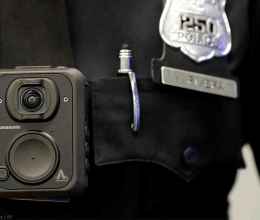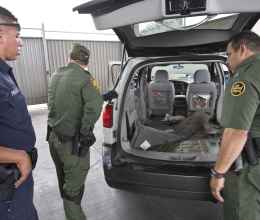
“U.S. law and American values of justice demand that those who come to our country seeking safety deserve a fair and timely decision about their applications, particularly if they are detained,” said Michael Kaufman, a staff attorney with the ACLU of Southern California. "The Obama administration has failed to provide that.”
U.S. law mandates that when individuals who have been previously deported from the United States are apprehended by the Department of Homeland Security and express a fear of returning to their countries of origin, they must receive a reasonable fear determination within 10 days as to whether their fear is reasonable and whether they can proceed with a hearing on their application for protection before an immigration judge. The U.S. government has violated this law in thousands of cases where individuals have waited for three months or more, usually while detained, for their interviews and decisions. Because individuals who receive positive determinations are not automatically eligible for release from detention, the delays in receiving reasonable fear determinations further extend the often lengthy period of detention individuals already face during the rigorous asylum process.
“The breakdown in the reasonable fear process puts an extremely vulnerable population in even more danger,” said Julia Harumi Mass, senior staff attorney at the ACLU of Northern California. “Many of these individuals tried to make a life in their countries of origin after being deported, but faced persecution and threats and now fear for their lives. While they wait in immigration jails, many have families in the U.S. or abroad who depend on them and may also be in danger.”
Since President Obama took office, Department of Homeland Security (DHS) interior enforcement programs have taken at least two million immigrants from their communities, including many long-time U.S. residents. Many left behind families in the United States and were deported to countries that have become extremely violent and unsafe. Others were more recent asylum seekers who attempted to seek protection the first time they crossed the border but were caught up in fast-track border deportation processes and quickly deported without having their fear of return acknowledged. When these individuals reenter the United States, they usually face one of two scenarios: their previous deportation orders are reinstated and they are removed without an opportunity to see a judge, or they have an opportunity to express their fear and are detained and placed into the reasonable fear process with hopes that they may be allowed to see a judge.
For Marco Antonio Alfaro Garcia, a named plaintiff in the lawsuit, the government’s failure to comply with its own rules has caused his family unnecessary pain and trauma. His youngest son was born while Mr. Garcia was detained and his two other U.S.-citizen children, ages four and three, cry daily, fearing they will never see their father again. Mr. Garcia was born in El Salvador and has lived in the United States since 2007. On January 2014 he was arrested by police and charged with driving under the influence. He was turned over to immigration authorities within hours, and informed that he would be sent back to El Salvador under a 2005 deportation order. Mr. Garcia immediately told immigration officials he feared returning to his homeland because he was twice brutally beaten by police, and feared retaliation because he had provided information about a criminal group to local prosecutors. On February 11, 2014, Mr. Garcia was finally interviewed by an asylum officer. More than two months later, Mr. Garcia has yet to receive a reasonable fear determination. He remains detained at the Adelanto Detention Facility, located about 80 miles north of downtown Los Angeles. Immigration officials have told him it could take up to six months before he receives a determination.
The delays not only result in inhumane and lengthy detention, but also are extremely costly to taxpayers, who are needlessly made to pay tens of millions of dollars as a result of the government’s failure to provide a timely decision. The federal government spends $119 a day to detain an immigrant.
 In charts and numbers: How the U.S. government detains individuals while delaying their requests for asylum
In charts and numbers: How the U.S. government detains individuals while delaying their requests for asylumRecently, President Obama and DHS Secretary Jeh Johnson announced that DHS will review immigration enforcement priorities to ensure they are as humane as possible within the constraints of the law. Promptly providing reasonable fear determinations for individuals seeking protection in the U.S. is the humane and resource-efficient solution.
“As our clients have experienced, the dysfunctional reasonable fear process subjects many people to lengthy, inhumane, and extremely costly detention before their asylum cases can even begin,” said NIJC Associate Director of Litigation Claudia Valenzuela. “It’s in everyone’s interest to have these cases quickly adjudicated.”
“By providing the relief sought in this case, the Court will assure that those who seek protection from torture or persecution in their countries of origin will receive the timely process guaranteed to them under U.S. law,” said James Rolfes, partner at Reed Smith LLP. “This system, when working as designed and mandated, gives hope to those who seek a new life in the United States.”
Resources
Download the complaint Read the regulation Meet the plaintiffs Visualize the issue with our infographic, or view it in Spanish.For media inquiries contact: Sandra Hernandez, shernandez@aclu-sc.org, 213.977.5252


